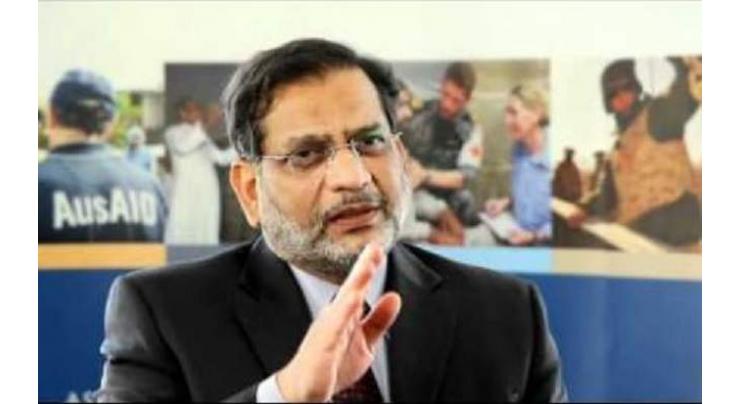
Pak Invests US$ 1.8 Bln In Disaster Management Endeavours: Lt Gen (R) Nadeem Ahmed
Fakhir Rizvi Published December 11, 2018 | 10:09 PM

Chief Executive Officer (CEO) National Disaster Risk Management (NDRMF) Lt Gen (R) Nadeem Ahmed Tuesday said Pakistan is spending around US$ 1.5 to 1.8 billion every year in disaster management endeavours in the consequence of various disasters occurring frequently in the country.
Talking to APP, NDRMF Chief Lt Gen (R) Nadeem Ahmed said the country with regards to her terrain is a disaster prone country where the finances put into efforts responding disasters worth 0.5-0.8 percent of GDP and 4-5 percent of the current expenditure which could be saved by investing in disaster risk reduction projects.
"This amount could bring huge social sector development which depends on the conduct of the stakeholders the way the handle the saved amount of the funds," he added.
"The annual Pre-Monsoon Conference prior to 2010 floods proposed the then Prime Minister to provide US$400 million for disaster risk reduction projects in the provinces to avoid the damages of lurking floods.
He refused to provide any assistance and claimed that after 18th it has become provincial subject to deal with disasters. The super floods caused US$ 10.5 billion worth loss to the national economy which underscores the significance of investment in disaster risk reduction," he maintained.
NDRMF, he said has been established for the first time in this region in the background of massive loss and damages bore by the country due to disasters and calamities. The Fund has received initial financial assistance of US$ 100 billion from Asian Development Bank, US$ 25 billion from the government, US$ 3.5 million, US$ 1.5 million by Swiss government, he added.
"The proactive, well knitted and long term approach of the Fund has attracted other international donors who state that as its approach covers all aspects from environment, gender disparity; social safeguards to procurement matters and other disaster management matters are addressed. The donors wanted to contribute into disaster risk reduction projects through NDRMF instead of giving direct finances to the project implementing organizations," he informed.
He said it's the first time that a government fund (NDRMF) would provide finances to the United Nations agencies, government departments, non-governmental organizations (NGOs) and international non-government organizations (INGOs) to implement disaster risk reduction projects.
"The Fund could not make things happen overnight so it adopted National Disaster Management Plan and National Flood Management Plan as a base document which is providing a lifeline for 10 years. Hence, the Fund has taken long term policy and structured approach," Lt Gen (R) Nadeem Ahmed said.
The Fund is not only dealing with disaster risk reduction rather disaster risk transfer as the risk which cannot be mitigated should be transferred through various mechanisms and techniques.
NDRMF is fully functional and operational with sufficient amount of finances available whereas it is an independent entity with its own board of directors comprising representatives from all quarters concerned, adding the board has passed 29 policies so far, he said.
There are certain public institutions that go redundant as the government had no funds available and in order to cope with that situation an endowment fund of US$ 123 million at an interest rate of 9.8 percent has been set up by the Fund, the CEO NDRMF informed. After 3 years, he said the 9 percent amount of worth nearly Rs 13 billion would be available whereas Asian Development Bank has managed to bear the cost of NDRMF's three years expenses, he added.
He said the Fund since its inception in April 2018 has faced major issues including institutional management amid transition of three governments from the outgoing, interim to the new government in power, corporate compliance whereas the fund has maximum to potential to incorporate climate change plan if formulated as at present there is only climate change policy.
Related Topics
Recent Stories

HEC reviews curricula for environmental sciences degree programme

ICC Asia looking forward to an action-packed Asia Cricket Week

Yuvraj Singh named ICC Men’s T20 World Cup 2024 Ambassador

Greece hands Olympic flame to 2024 Paris Games hosts

Two Kyiv hospitals evacuating over feared Russian strikes

World must act on neurotech revolution, say experts

Charles & Catherine's cancer diagnoses

Champions Alcaraz and Sabalenka through in Madrid Open

King Charles to resume some public duties during cancer treatment: palace

US defense chief announces $6 bn in security aid for Ukraine

Heavy rains cause damage to Spezand-Taftan railway track

Woman stabbed in Israel, attacker killed: police
More Stories From Pakistan
-
Saudi ministry warns against fraudulent Hajj schemes; urges vigilance, official channels for booking
3 hours ago -
SC to take up 9 identical petitions regarding judges' letter
4 hours ago -
Woman committed suicide in Pindigheb
4 hours ago -
Teenage girl abducted in Hassanabdal
4 hours ago -
NTDC Super 8 Inter-Departmental Tape Ball Cricket Tournament concludes: GM (HR) team clinches the w ..
4 hours ago -
AJK President calls for overseas Kashmiris' proactive role to expose the Modi government's nefarious ..
4 hours ago
-
AJK-wide campaign begins to vanish black-tinted glasses to all sorts of vehicles
4 hours ago -
Islamabad to be digitalized as pilot project under national digitalization plan: IT Minister
4 hours ago -

HEC reviews curricula for environmental sciences degree programme
5 hours ago -

Heavy rains cause damage to Spezand-Taftan railway track
5 hours ago -

Documentary on life of Jamiluddin Aali screened at embassy
5 hours ago -

"Sindh Theater Festival 2024" commences in Larkana
5 hours ago



